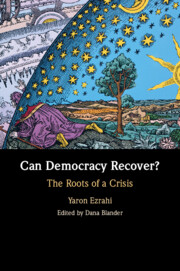Book contents
- Can Democracy Recover?
- Can Democracy Recover?
- Copyright page
- Dedication
- Contents
- Preface
- Words from the Author
- Introduction
- Part I The Rise of Western Politics following the Collapse of the Monistic Medieval Cosmology
- Part II The Emergence of the Epistemological Constitution of Modern Democracy
- 4 The Imaginary of the Modern Democratic Individual as a Political Agency
- 5 Democratic Political Causality
- 6 Public Facts as Political Currency
- 7 The Visibility and Accountability of Political Power
- 8 Objectivity as a Fictional Limit of the Political
- Part III The Dialectics of Objectification
- Part IV The Erosion of the Epistemological Constitution of Modern Democracy
- Part V Democracy beyond Modernity
- Can Democracy Recover? Concluding Reflections
- Epilogue
- Index
8 - Objectivity as a Fictional Limit of the Political
from Part II - The Emergence of the Epistemological Constitution of Modern Democracy
Published online by Cambridge University Press: 02 January 2025
- Can Democracy Recover?
- Can Democracy Recover?
- Copyright page
- Dedication
- Contents
- Preface
- Words from the Author
- Introduction
- Part I The Rise of Western Politics following the Collapse of the Monistic Medieval Cosmology
- Part II The Emergence of the Epistemological Constitution of Modern Democracy
- 4 The Imaginary of the Modern Democratic Individual as a Political Agency
- 5 Democratic Political Causality
- 6 Public Facts as Political Currency
- 7 The Visibility and Accountability of Political Power
- 8 Objectivity as a Fictional Limit of the Political
- Part III The Dialectics of Objectification
- Part IV The Erosion of the Epistemological Constitution of Modern Democracy
- Part V Democracy beyond Modernity
- Can Democracy Recover? Concluding Reflections
- Epilogue
- Index
Summary
This chapter inquires the significance of objectivity within the democratic epistemological framework, tracing its origins to the dual naturalistic cosmology where Nature is perceived as autonomous and humans as impartial observers. Central to objectivity and “disinterestedness” is the belief that the external world remains impervious to subjective influence. This idea is exemplified in the association of objectivity with technological advancements and human-made machinery. Ezrahi contends that despite being a human creation, science has attained autonomous status as a source of truths, reintegrating Nature into Culture and emphasizing the importance of humility, given that science itself adheres to natural laws. He also underscores the complex position of humanity within the Nature/Culture dichotomy, where the human body is part of Nature, while human creations belong to Culture. Nature embodies necessity and unchangeable laws, constraining human freedom, whereas Culture represents voluntarism, freedom, human interiority, and social behavior. The chapter illustrates how scientists and politicians leverage their scientific authority to project objectivity and disinterest, legitimizing government policies while suppressing dissent and effectively depoliticizing decisions. The text emphasizes that the concept of external Nature linked to objectivity is a product of Western cosmology and not universally applicable.
- Type
- Chapter
- Information
- Can Democracy Recover?The Roots of a Crisis, pp. 82 - 90Publisher: Cambridge University PressPrint publication year: 2025

